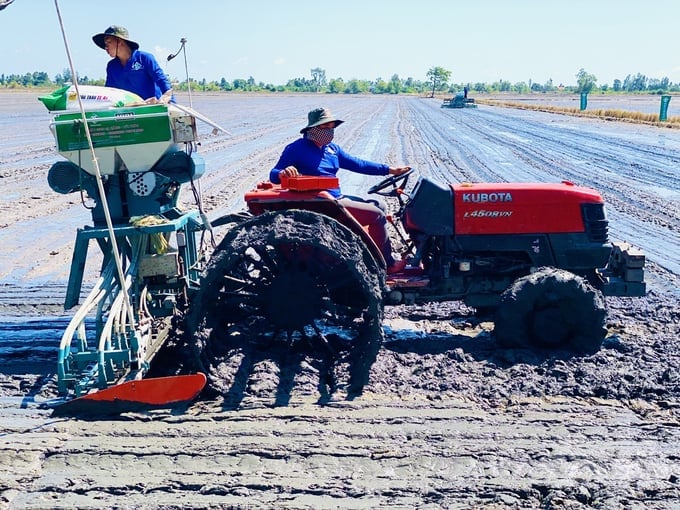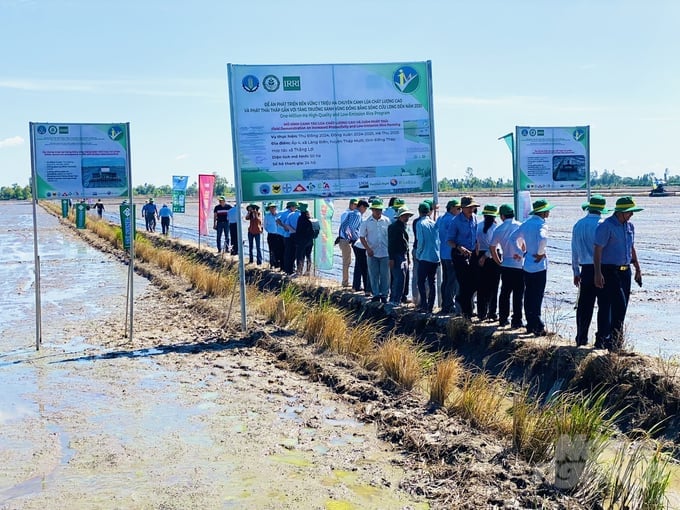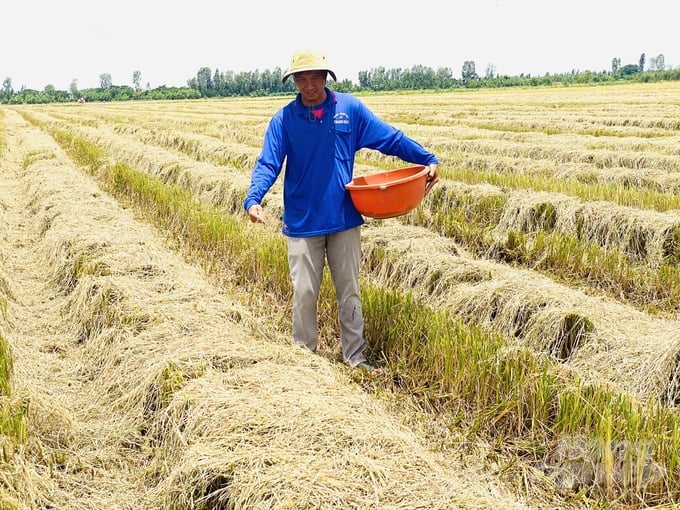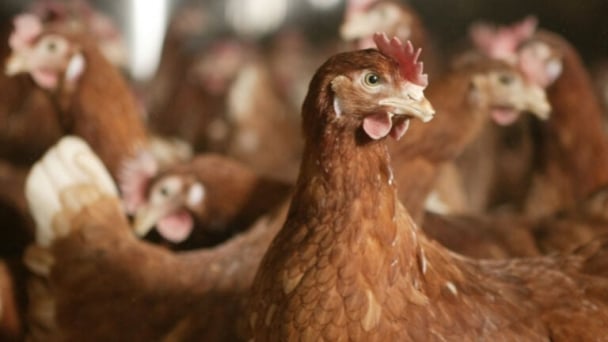June 26, 2025 | 03:52 GMT +7
June 26, 2025 | 03:52 GMT +7
Hotline: 0913.378.918
June 26, 2025 | 03:52 GMT +7
Hotline: 0913.378.918

Dong Thap is the third unit in the Mekong Delta to launch the Project for 1 million hectares of high-quality, low-emission rice linked to green growth in the Mekong Delta by 2030. Photo: Le Hoang Vu.
The Department of Crop Production (Ministry of Agriculture and Rural Development) in collaboration with the Department of Agriculture and Rural Development of Dong Thap recently launched the project for 1 million hectares of high-quality, low-emission rice linked to green growth in the Mekong Delta by 2030.
The project launch ceremony took place at Thang Loi Agricultural Service Cooperative (My Dong commune, Thap Muoi district). The cooperative is participating in a high-quality, low-emission rice cultivation model with an area of 50 hectares, involving 24 households starting from the summer-autumn, autumn-winter 2024, and winter-spring 2025 crops.
Farmers participating in the model receive 50% of the costs for inputs such as seeds, fertilizers, and Trichoderma bio-products for straw decomposition, and mechanization costs (cluster seeding/aerodynamic row seeding machines, drone spraying) from the government. The remaining 50% of the costs is mobilized from socialization support sources, including seeds, fertilizers, cluster seeding costs, greenhouse gas emission assessment costs, and field evaluation workshops, sponsored by companies like Binh Dien Fertilizer Joint Stock Company, Sai Gon Kim Hong Company, Tu Sang Co., Ltd, Bayer Vietnam Co., Ltd, and Vietnam Rice Co., Ltd.

In 2024, the entire province of Dong Thap registered to participate in the 1 million hectares of high-quality rice project with an area of 28,000 hectares, nearly 70,000 hectares in 2025, and up to nearly 162,000 hectares by 2030. Photo: Le Hoang Vu.
As the first cooperative in Dong Thap province selected to initiate the Project, Mr. Nguyen Van Hung, Director of Thang Loi Agricultural Service Cooperative, shared that the cooperative has long successfully implemented technical advancements in the fields, which have received strong support from the local community. The most recent examples include the SRP rice production model, production log recording, and the comprehensive mechanization of the fields. With the existing experience and the strong determination of its members, the cooperative is committed to effectively implementing this Project.
According to the initial agreement between Thang Loi Agricultural Service Cooperative and the service providers and companies, during the autumn-winter 2024 crop season, businesses will establish linkages and guarantee product purchase for the farmers.
Mr. Huynh Thanh Man, Head of Tam Viet Clubhouse (Thuong Thoi Tien town, Hong Ngu district), stated: “Tam Viet Clubhouse is one of the units selected to implement the Project starting from the autumn-winter 2024 rice crop. We farmers are very excited and confident about the positive outcomes the Project will bring. By participating in the Project, farmers will receive support to apply scientific and technical advancements like '3 reductions, 3 gains,' '1 must, 5 reductions,' and the application of 4.0 technology in the fields, which will help reduce production costs and increase profits.”

Farmers process microbial products to decompose straw in the fields, turning it into organic fertilizer for crops. Photo: Le Hoang Vu.
According to Mr. Nguyen Van Vu Minh, Director of the Department of Agriculture and Rural Development of Dong Thap, the launch of the Project aims to establish a specialized high-quality rice cultivation area with low emissions, linked to the reorganization of the production system along the value chain, and the application of sustainable farming practices to increase value. This will help the local area sustainably develop the rice industry, improve production and business efficiency, as well as the income and livelihoods of rice farmers, protect the environment, adapt to climate change, and reduce greenhouse gas emissions.
Dong Thap is one of the five provinces selected to pilot the Project in the Mekong Delta region. In 2024, the entire province of Dong Thap registered to participate in the Project with an area of 28,000 hectares, nearly 70,000 hectares in 2025, and by 2030, this area is expected to increase to nearly 162,000 hectares.
According to the 2025 plan, Dong Thap province will implement the Project in seven rice-growing districts and cities, including Tan Hong, Hong Ngu, Tam Nong, Thanh Binh, Cao Lanh, Thap Muoi, and Hong Ngu City, covering a total area of nearly 70,000 hectares. By 2030, the Project will also be implemented in Lap Vo district, with the goal of reaching a total area of 161,000 hectares.
Translated by Mai Quang Huy

(VAN) Research has shown that Hy-Line brown hens may be better suited for cage-free production based on overall greater egg production and other quality metrics.
![Turning wind and rain into action: [9] Digitizing hydrometeorological data in response to climate change](https://t.ex-cdn.com/nongnghiepmoitruong.vn/608w/files/news/2025/06/17/z6704423696987_15fd32ffc26d590d204d520c9dac6786-nongnghiep-165943.jpg)
(VAN) Farmers have begun accessing hydrometeorological applications to adjust their cropping schedules, aiming to ensure productivity and adapt to climate change.
![Turning wind and rain into action: [8] Real-time salinity detection and early warning technology](https://t.ex-cdn.com/nongnghiepmoitruong.vn/608w/files/news/2025/06/17/z6704423696987_15fd32ffc26d590d204d520c9dac6786-nongnghiep-151127.jpg)
(VAN) Thanks to the integration of modern hydrological-hydraulic models, remote sensing technologies, and artificial intelligence, the accuracy of hydrological forecasting has significantly improved.
![Turning wind and rain into action: [7] Early disaster warnings help marine farmers minimize losses](https://t.ex-cdn.com/nongnghiepmoitruong.vn/608w/files/news/2025/06/17/z6704423696987_15fd32ffc26d590d204d520c9dac6786-nongnghiep-142942.jpg)
(VAN) In recent years, thanks to early disaster warnings and forecasting, marine farmers in Khanh Hoa province have been able to reduce risks and losses, thereby improving production efficiency.
![Turning wind and rain into action: [6] ‘Four on-the-spot’ disaster management software](https://t.ex-cdn.com/nongnghiepmoitruong.vn/608w/files/news/2025/06/17/e5a48259d6a262fc3bb3-nongnghiep-183800.jpg)
(VAN) By simply activating the scenario on the disaster management software, the relevant authorities immediately know how many households need to be evacuated, where to evacuate them to, and by what means of transportation…
![Turning wind and rain into action: [5] Hue applies modern technology in disaster forecasting](https://t.ex-cdn.com/nongnghiepmoitruong.vn/608w/files/news/2025/06/17/z6704423696987_15fd32ffc26d590d204d520c9dac6786-nongnghiep-093938.jpg)
(VAN) In Hue city, modern technology has recently been applied in meteorological and hydrological forecasting and warning, helping to reduce the damage caused by natural disasters.

(VAN) A cutting-edge farming technique being implemented on an experimental ranch in Arizona's Sonoran Desert has already saved a billion gallons of water over five years, according to Civil Eats.